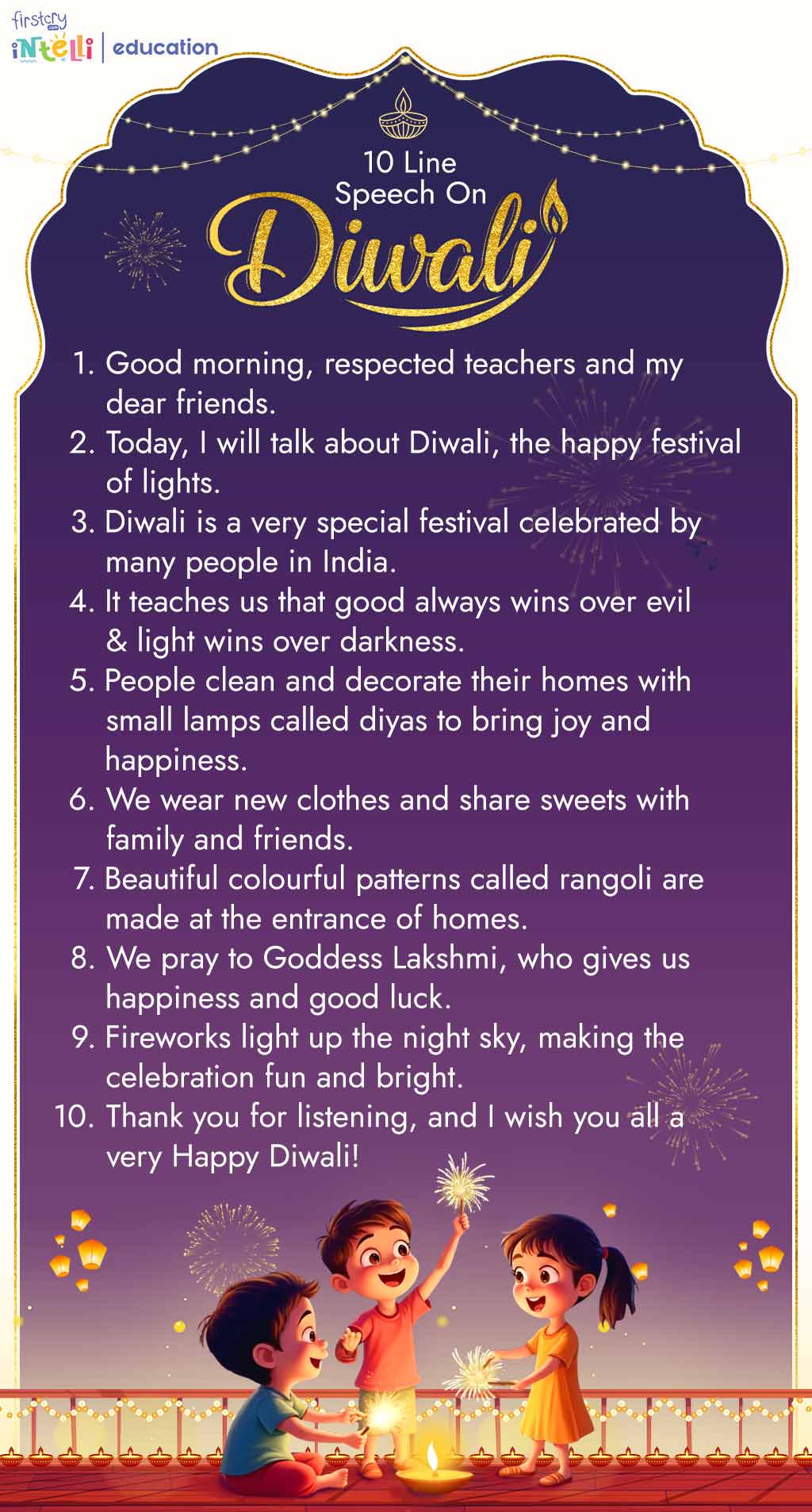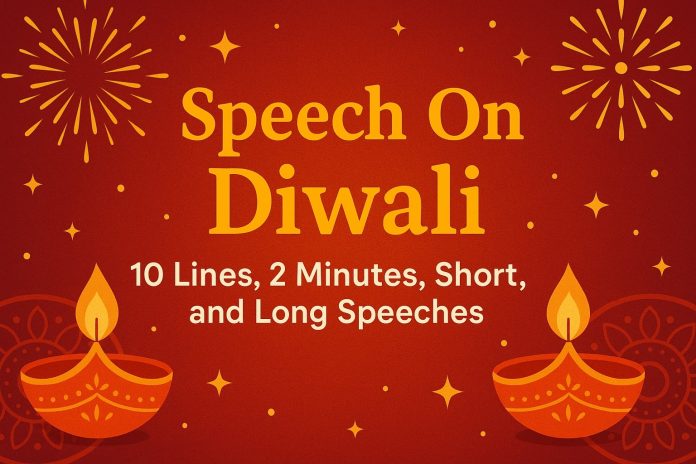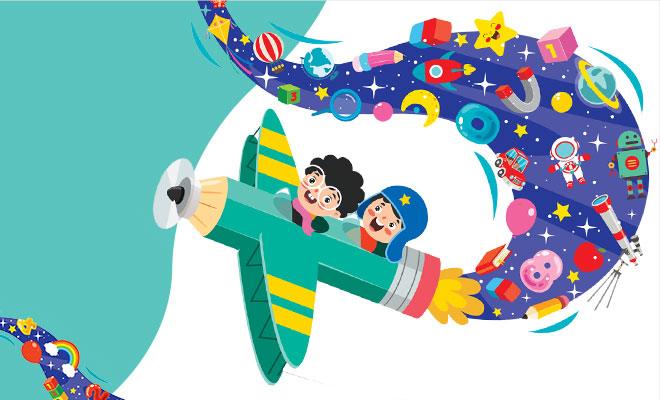Last Updated on October 8, 2025
Diwali, also known as Deepavali, is celebrated across India as the Festival of Lights, symbolising the triumph of good over evil and hope over darkness. Every year, families come together to decorate their homes with diyas and colourful lights, enjoy fireworks, and prepare delicious sweets. This joyful festival encourages values of kindness, unity, and gratitude among children and students. In schools, a speech on Diwali is a popular activity, allowing students to confidently express the importance, traditions, and meaning of the occasion. Whether you need a short 10-line Deepavali speech in English for children and students, a 2-minute speech, or a long address, this article provides practical examples and tips to help anyone prepare a memorable and inspiring speech on Diwali.
Thank you for reading this post, don't forget to subscribe!
10 Line Speech On Diwali
Here is a 10-line speech on Diwali crafted for young children. This Happy Diwali speech is simple and perfect as a speech for class 1, highlighting the joy and traditions of the festival.
- Good morning, respected teachers and my dear friends.
- Today, I will talk about Diwali, the happy festival of lights.
- Diwali is a very special festival celebrated by many people in India.
- It teaches us that good always wins over evil and light wins over darkness.
- People clean and decorate their homes with small lamps called diyas to bring joy and happiness.
- We wear new clothes and share sweets with family and friends.
- Beautiful colourful patterns called rangoli are made at the entrance of homes.
- We pray to Goddess Lakshmi, who gives us happiness and good luck.
- Fireworks light up the night sky, making the celebration fun and bright.
- Thank you for listening, and I wish you all a very Happy Diwali!

1 Minute Speech On Diwali
This section offers a simple and heartfelt Diwali celebration speech, ideal for a one-minute delivery. It captures the spirit and joy of the festival, making it easy to present with confidence and charm.
Good morning, respected teachers and dear friends.
Diwali, the Festival of Lights, is celebrated with joy and happiness across many countries. It marks the victory of good over evil and the triumph of light over darkness. Families clean and decorate their homes with lamps called diyas and make beautiful rangoli patterns. We wear new clothes and share delicious sweets with family and friends. Fireworks add fun and excitement to the celebrations. People also pray to Goddess Lakshmi for wealth and happiness. Diwali teaches us to be kind, hopeful, and truthful. It is a time for togetherness and new beginnings, spreading love and light wherever we go.
Wishing everyone a very Happy Diwali filled with joy and peace!
2 Minute Speech On Diwali
This Diwali festival speech offers a detailed yet simple overview of the celebrations and significance of Diwali. It is perfect for those who want to share the joy and meaning of this vibrant festival within two minutes.
Good morning, respected teachers and dear friends.
Today, I am delighted to discuss Diwali, the wonderful Festival of Lights. Diwali is a very special festival celebrated by millions of people across India and the world. It marks the victory of good over evil and light over darkness. During this festival, homes are cleaned and decorated with beautiful lamps called diyas, and colourful rangoli designs are made at the entrance. Families wear new clothes and enjoy sharing sweets and gifts. Fireworks light up the night sky, adding fun to the celebrations. We also pray to Goddess Lakshmi, the goddess of wealth, to bring happiness and prosperity. Diwali teaches us important values like kindness, hope, and togetherness. It is a time when people come together to celebrate love, light, and joy. Let us all remember to spread happiness and help each other in every way possible. It also reminds us to leave behind anger and forgive others to live peacefully. This festival brings families and friends closer, creating beautiful memories.
Thank you, and a very Happy Diwali to everyone!
Short Speech On Diwali
Diwali is a bright and colourful festival that brings families and communities together. This short speech captures the warmth and happiness of the celebrations in a simple way.
Good morning, respected teachers and dear friends. Today, I am pleased to share a speech about Diwali, the wonderful Festival of Lights that fills our lives with joy and hope. Diwali is not just a festival; it is a celebration of the victory of good over evil and the triumph of light over darkness. It teaches us important values like kindness, unity, and new beginnings.
The festival lasts five days, each with its own special meaning and customs. It begins with Dhanteras, when people buy new things and prepare for the celebrations. On Naraka Chaturdashi, people symbolically cleanse their minds and homes to banish negativity. The main day, Lakshmi Puja, is devoted to welcoming the goddess of wealth and prosperity. People decorate their homes with lamps called diyas and create colourful rangoli patterns. Fireworks light up the sky, and families share sweets and gifts, strengthening bonds and spreading happiness.
Diwali varies across regions—some celebrate the return of Lord Rama to Ayodhya, while others honour Goddess Kali or remember different legends. Despite the differences, the message is the same: hope, light, and goodness will always prevail.
In recent years, eco-friendly celebrations have become important. People now choose safer fireworks, use traditional lamps, and focus on helping those in need. Diwali encourages us to be grateful, share generously, and live in harmony with both nature and one another. It is a time to forgive, make peace, and welcome new opportunities for happiness and growth.
May this Diwali bring light into our hearts and homes, and may we continue to spread its valuable lessons throughout the year. Let us all celebrate with love, happiness, and respect for our planet. Thank you, and I wish everyone a very Happy Diwali!
Long Speech On Diwali
A Diwali speech in English for classes 1, 2, and 3 offers a detailed and engaging look at the festival’s traditions and meanings. This long speech helps young learners appreciate the cultural importance and joyful spirit of Diwali.
Good morning, respected teachers and dear friends.
Today, I am excited to speak about Diwali, the Festival of Lights, which is celebrated with great enthusiasm across India and many parts of the world. This festival is a time of joy, togetherness and spiritual significance, symbolising the victory of light over darkness and good over evil. Let us explore why Diwali is celebrated, its importance, and how we can observe it thoughtfully.
Why and How Is Diwali Celebrated?
Diwali is celebrated to honour the triumph of goodness and light over evil and darkness. One popular story is about Lord Rama, who returned to his kingdom after defeating the demon king Ravana. To welcome him, people lit oil lamps called “diyas,” a tradition that continues to this day. Homes and streets are decorated with bright lamps and colourful rangoli patterns. Families wear new clothes, share sweets and gifts, and pray to Goddess Lakshmi, the goddess of wealth and prosperity. Fireworks light up the night, adding to the festival’s vibrant and joyful atmosphere.
Importance Of The Five Days Of Diwali and Its Celebration
Diwali spans five days, each with special meaning and customs:
- Dhanteras: The first day focuses on welcoming wealth and prosperity; people clean their homes and buy new utensils or jewellery.
- Naraka Chaturdashi: Also known as the second day or Chhoti Diwali, it celebrates Lord Krishna’s victory over the demon Narakasura and encourages cleansing and renewal.
- Lakshmi Puja: The main day of Diwali, when families worship Goddess Lakshmi and Lord Ganesha to seek blessings for health and fortune. Homes are brightly lit with diyas and colourful rangoli.
- Govardhan Puja: A day commemorating Lord Krishna’s protection of villagers by lifting a mountain to save them from floods. It also marks the start of the Hindu New Year.
- Bhai Dooj: The final day celebrates the sacred bond between brothers and sisters, where sisters pray for their brothers’ well-being and brothers give gifts in return.
Things to Keep In Mind During Diwali Celebration
Celebrating Diwali with care can make the festival safer and more meaningful. Here are five tips to remember:
- Use eco-friendly decorations and limit the use of fireworks to protect the environment.
- Light diyas carefully and keep flammable materials away to prevent accidents.
- Respect neighbours by controlling noise and avoiding late-night celebrations.
- Share sweets and gifts with family, friends, and those in need to spread happiness.
- Take time for forgiveness and peace-making, welcoming new beginnings with a pure heart.
Diwali is a beautiful festival that brings light, love, and hope into our lives. By celebrating with kindness, safety, and respect for traditions, we uphold the true spirit of this joyous occasion. May this Diwali fill your hearts and homes with peace, prosperity, and happiness.
Thank you for listening, and I wish you all a very Happy Diwali!
Points To Consider While Preparing And Giving A Speech On Diwali
This section outlines key points to consider when preparing and delivering a speech on Diwali. Following these tips will help you deliver your speech with confidence and effectiveness.
- Practice your speech several times to build confidence and ensure smooth delivery.
- Speak clearly and at a steady pace so everyone can understand you easily.
- Include interesting facts or personal experiences to make your speech engaging and relatable.
- Use polite and respectful language, especially when mentioning religious stories or customs.
- Maintain good eye contact with the audience and use natural gestures to express your thoughts effectively.
FAQs
1. How Can Practising My Speech Improve My Delivery?
Practising helps build confidence and reduces nervousness, allowing for a smoother, more natural presentation.
2. What Role Does Including Personal Experiences Play In A Speech?
Sharing personal stories makes your speech more relatable and engaging, helping you connect with your listeners on an emotional level.
3. How Should I Manage Nervousness Before And During My Speech?
Taking deep breaths, practising regularly, and visualising a positive outcome can help calm nerves and improve confidence.
These example speeches are designed to help students understand the significance of Diwali and inspire them to write their own meaningful presentations. With practice and preparation, every student can confidently share the joy and values of this wonderful festival.
Also Read:
Essay on Diwali for Kids
Essay on Festivals of India
Dussehra Essay in English for Kids











